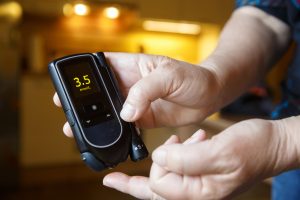
It certainly is. And it can be dangerous.
If you’re taking insulin as part of your diabetes treatment, you may run the risk of low blood sugar, also called hypoglycemia. It is one of the most common serious side effects of diabetes treatment.
Hypoglycemia can lead to falls, hospital visits, and has the potential to boost the risk of stroke and death.
According to new research published in the Journal of Internal Medicine, many doctors aren’t adequately explaining the risk of hypoglycemia or preventative measures with diabetic patients. This can be a very costly oversight.
For example, researchers learned that clinicians were not counseling patients against driving a car if their blood sugar is low. Low blood sugar may lead to trouble thinking and boost the risk of an accident.
Symptoms of hypoglycemia include:
- The shakes
- Dizziness
- Sweating
- Hunger
- Rapid heartbeat
- Trouble concentrating/thinking
- Confusion
- Irritability/mood swings
- Anxiety/nervousness
- Headaches
- Night sweats
Symptoms can become more severe when left untreated and put you at greater risk for injury or health complications.
Preventing hypoglycemia is possible if you’re aware of the risks and make a concerted effort to manage blood sugar levels. Talk to your doctor about an individualized treatment protocol while at the same time do your best to:
- Monitor blood sugar as instructed.
- Eat on a schedule and avoid delaying or skipping meals or snacks.
- Consume a simple sugar, like fruit juice, when blood sugar is low.
- Take prescribed medication dosage when scheduled.
- Adjust medication/food intake for activity. In other words, if you’re moving more for longer, you may need to eat more and alter medicine.
- If you drink alcohol, eat with it.
- Record low glucose reactions.
Being aware of the risks and preventative measures of hypoglycemia can help you stay safe. Talk to your doctor about your specific case.